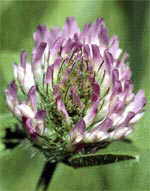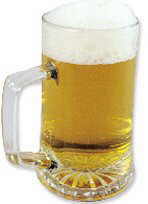Phytoestrogens cause Menstrual Cramps
by Elizabeth Smith, MD
Phytoestrogens, Naturally Occurring Plant Estrogens, the Ones to Avoid that may cause Menstrual Cramps
Just because something is natural does not mean
it is good for you or harmless. Toadstools are natural, but those mushrooms are poisonous. Menstrual cramps
may also be provoked by some plants, foods and herbs. The therapeutic effect of Natural Progesterone may also be
blocked by some herbs.
How to avoid Bad Phytoestrogens
Plants produce chemicals that mimic estrogen and/or block estrogen, and/or block progesterone. The human body has receptors to both estrogen and progesterone. These receptors will respond not only to the body's hormones, but also plant hormones. In general, phytoestrogens are thought to wash out of the body within several days in contrast to months or decades that the synthetic chemical xenoestrogens take to be excreted. Whole grains, fruits, seeds, beans and herbs all are know to have estrogen and/or progesterone activity. The most famous is soy. In general, any food that has been eaten by a culture or people group for centuries is probably all right to eat if the people group in question is relatively free from these estrogen related diseases. When referring to phytoestrogens, it is generally thought that a "weak" estrogen may actually be protective against cancer causing xenoestrogens. The best example is Lilian Thompson PhD's work that showed that oral ground flax seed reduced breast cancer size between the time of diagnosis and surgery. The phytoestrogen contained in the flax seed binds to the progesterone receptor, but does not stimulate it. The flax seed phytoestrogen competes with other estrogens that would otherwise stimulate the estrogen receptor. The flax seed phytoestrogen acts as a blocker. In contrast, a strong phytoestrogen may actually make the disease worse. Again the list that follows is incomplete because of the lack of research money and interest:
Coffee
Coffee is a known phytoestrogen that exacerbates menstrual cramping. Since it is a phytoestrogen, decaffinated coffee may still be able to act as an estrogen.
``Higher estrogen levels would not be beneficial for women who for example have endometriosis, breast pain and family histories of breast or ovarian cancer, especially arising premenopausally,'' the study's lead author, Dr. Daniel W. Cramer from Brigham and Women's Hospital in Boston, Massachusetts, told Reuters Health.
``It is my personal advice that such women should be discouraged from consuming more than two cups of coffee per day,'' Cramer said.
In fact, caffeine intake from all sources was linked with higher estrogen levels regardless of age, body mass index (BMI), caloric intake, smoking, and alcohol and cholesterol intake. Women who consumed at least 500 milligrams of caffeine daily, the equivalent of four or five cups of coffee, had nearly 70% more estrogen during the early follicular phase than women consuming no more than 100 mg of caffeine daily, or less than one cup of coffee.
Clover, Red Clover tea, Alfalfa Sprouts
In the 1940's, the sheep farmers of Perth
in western Austrailia began to experience an  epidemic of still
births despite three seasons of exceptionally good weather. The handsome merino sheep looked healthy. However,
the ewe's failed to go into labor; the lambs died in still birth and often the mothers as well. In a matter of
5 years, the ewes failed to conceive at all even after repeated breeding with fertile rams.
epidemic of still
births despite three seasons of exceptionally good weather. The handsome merino sheep looked healthy. However,
the ewe's failed to go into labor; the lambs died in still birth and often the mothers as well. In a matter of
5 years, the ewes failed to conceive at all even after repeated breeding with fertile rams.
Federal and agricultural specialists found the problem. Clover. Fifteen years earlier, ranchers had imported a clover from the Mediterranean region in Europe. The first scientific paper on this phenomenom appeared in the Austrailian Veterinary Journal in 1946 and proclaimed this as "clover disease". Three years later three chemicals were identified as suspects. Finally, formononetin only one of the chemicals was determined to be the culprit. Formononetin mimics estrogen.
Sunflower Seeds
Coumestrol found in sunflower seeds when fed to the mother rat caused permanent reproductive problems in the rat pups: female pups when grown did not ovulate, and the male pups had altered mounting behavior and fewer ejaculations. Neonatal rats and immature rats exposed to coumestrol had premature estrous cycles. Flax seed oil and Soy oil are known NOT have the active phytoestrogens. Sunflower oil MAY or MAY NOT have active hormone components in it.
Queen Anne's lace (wild carrot)
During the fourth century B.C., Hippocrates noted that Queen Anne's Lace prevented pregnancies.
Pomegranate
The Greeks used this plant as a contraceptive. Modern research confirms strong estrogen activity.
Fennel
Used in the ancient world to prevent pregnancy and precipitate abortions.
Licorice, Red Clover, Yucca, Hops (Beer) and Motherwort
 Zava, PhD showed that these herbs stimulated estrogen receptor positive breast
cancer cells to grow. Red Clover and Yucca were found to be equal in potency to estradiol at the same concentrations.
Women who harvest hops for beer begin menstruating 2 days later anecdotally. Zava has confirmed that beer has a
significant amount of phytoestrogens that have moderate estrogen activity from hops used in the flavoring of beer.
Zava, PhD showed that these herbs stimulated estrogen receptor positive breast
cancer cells to grow. Red Clover and Yucca were found to be equal in potency to estradiol at the same concentrations.
Women who harvest hops for beer begin menstruating 2 days later anecdotally. Zava has confirmed that beer has a
significant amount of phytoestrogens that have moderate estrogen activity from hops used in the flavoring of beer.
Bloodroot, Ocotillo, Mandrake, Oregano, Damiana, Pennyroyal, Verbenna, Nutmeg, Tumeric, Yucca, Thyme, Calamus rt., Red Clover, Goldenseal, Licorice, Mistletoe, Cumin, Fennel, Camomille, Cloves.
There are separate estrogen and progesterone
receptors. Zava, PhD was able to show that the above herbs are able to bind to the progesterone receptor. These
herbs would compete against any natural progesterone taken and should also be avoided. Interestingly enough all
the progesterone binding herbs were antagonists or neutral meaning they competed against progesterone and worked
against it or blocked progesterone. None of them were progesterone stimulators. Bloodroot, mandrake, pennyroyal,
yucca, and mistletoe all have very strong progesterone binding activity and are used as abortifacents (create an
abortion), and to bring on menses. Bloodroot was used in England to treat breast cancer 100 years ago, and was
used by Native Americans to treat surface tumors. Herbalists today use it to treat breast cancers, nasal polyps,
and cervical dysplasia. Mistletoe has been used for 100 years in Europe to treat breast cancer and leukemia.
Herbs that Suppress Breast Cancer Cell Growth
Zava, PhD also found that Mandrake, Bloodroot,
and Juniper stunted the growth of BOTH estrogen receptor positive breast cancer cells and estrogen receptor negative
breast cancer cells. Saliva estradiol results also showed very low estradiol in women taking the Chinese herb Dong
Quai. It is thought that Dong Quai suppresses estradiol synthesis.
Cotton Seed Oil
Since the 1970s most of the work on cottonseed oil as an antispermatogenic has been conducted in China, after Chinese authorities noted decreased fertility in some provinces in the late 1950s and eventually linked it with the use of cottonseed oil in cooking. In one study rats fed 0.5 milliliters of cottonseed oil a day produced no viable sperm at the end of the 28-day test period. Cotton is the most intensively sprayed field crop in the world, accounting for more than 10 percent of the pesticides used worldwide and 25 percent of the pesticides used in the U.S. Yet despite cotton's role in the food chain, chemicals that are banned for use on food crops are used on cotton.
Summary
Pharmaceutical companies routinely travel to the jungles to seek native cures. They modify traditional herbal remedies to create prescription drugs. One such example is digoxin that is derived from a traditional Irish tea and the fox glove plant. Many herbs, foods and spices have estrogen activity as well as progesterone activity. In general, if a people group has been eating a particular food for centuries and have relatively small amounts of estrogen linked diseases, the food is safe to consume in reasonable quanities.
- Avoid Coffee, Decaffinated Coffee, and Beer
- Avoid Sunflower Seeds, Red Clover Tea, Camomille Tea, Alfalfa Sprouts, Queen Anne's lace (wild carrot), Pomegranate, Fennel, Fenugreek, Licorice, Red Clover, Yucca, Hops (Beer) and Motherwort.
- Avoid Phytoestrogens that block and interfere
with the action of Natural Progesterone. Avoid Bloodroot, Ocotillo, Mandrake, Oregano, Damiana, Pennyroyal, Verbenna,
Nutmeg, Tumeric, Yucca, Thyme, Calamus rt., Red Clover, Goldenseal, Licorice, Mistletoe, Cumin, Fennel, Camomille,
Cloves.
- No Sunflower Oil, No Safflower Oil, and No Cotton Seed Oil.
![Early Puberty caused by xenoestrogens and Menstrual Cramps caused by xenoestrogens. [Chemical estrogens (xenoestrogens) cause early puberty in girls.]](earlypuberty.gif)
![Progesterone for curing Menstrual Cramps. [Therapeutic Natural Progesterone for Menstrual Cramps.]](proad.gif)